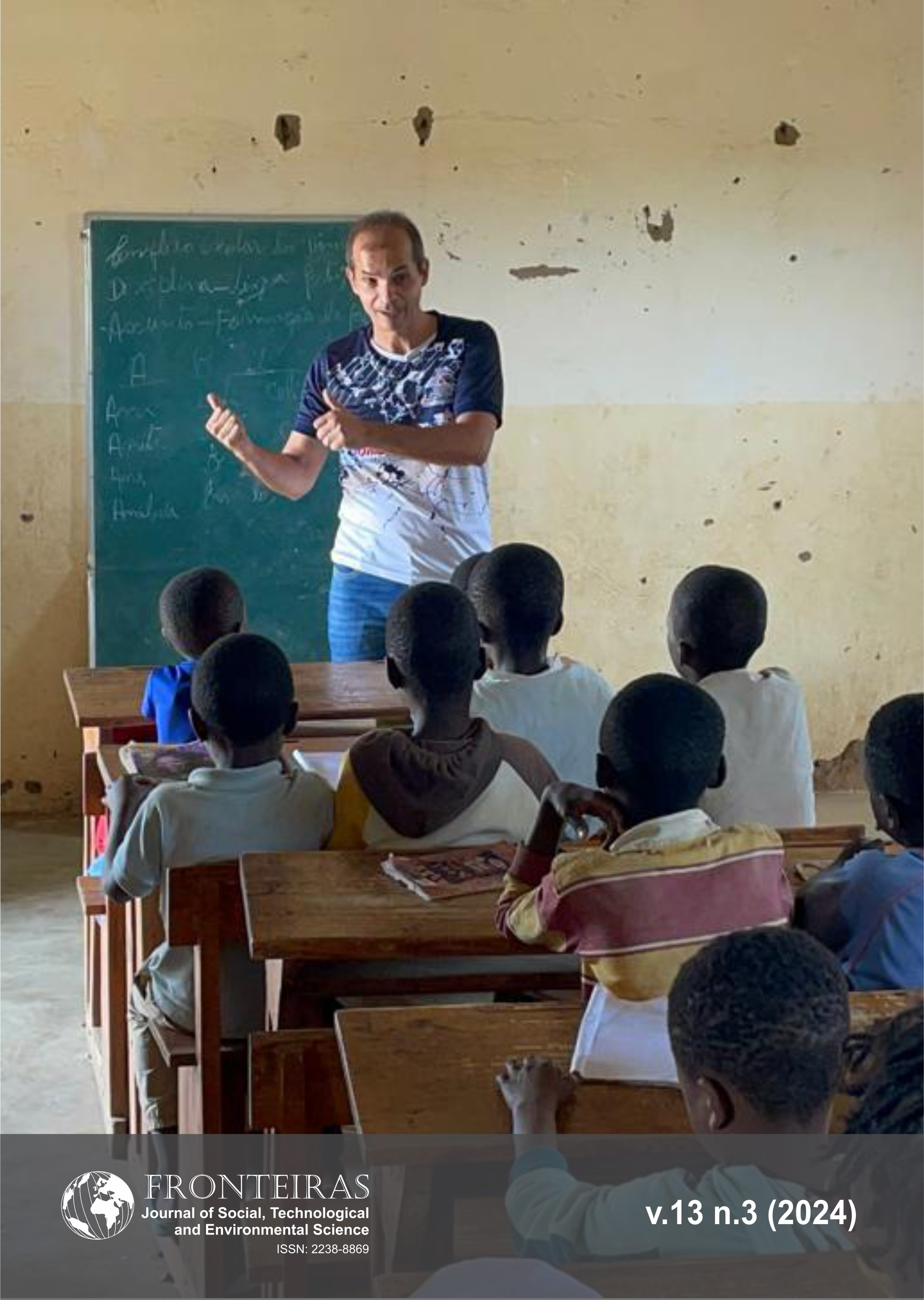Materials Challenge and Lixolandia: A Pedagogical Experience to Sensitize About Recycling in the Classroom
DOI:
https://doi.org/10.21664/2238-8869.2024v13i3.p78-92Keywords:
recycling, meaningful learning, pedagogical material, action-participatory research, learning-based gamesAbstract
As part of the New Arrangements for Research and Innovation (NAPI) "Food and Territory" program, funded by the Araucária Foundation, which operates in the Southwest and Coast of the State of Paraná, Brazil, we report on the process and results of environmental awareness workshops held in two schools, one on the urban periphery of Francisco Beltrão and the other in the rural area of the same municipality. The workshops focused on the subject of recycling, and two activities were developed: the Lixolandia story and the Materials Challenge, both developed from a perspective of meaningful learning, which sought to explore/instigate the children's creativity, starting from their sensitive universe, previous knowledge and curiosity. Through games and role-playing, we uncovered questions about the composition and functions of materials, environmental contamination and, above all, using the same recycling materials, the children created possible worlds in a magical realism open to their imagination. All the while, we challenged them through dialogical opposites, such as starting at the end of the story, imagining a world dominated by objects that no longer served any purpose and playing a game with no losers. The result was an action-participatory research practiced inside the classroom, but far beyond it, we demonstrated through the paths of feeling-thinking that we can form critical and creative children within the university-territory relationship, with responsibility for social transformation and environmental commitment.
References
Alencar E ML 1975. Efeitos de um programa de criatividade em alunos de 4. ª e 5. ª séries. Arquivos Brasileiros de Psicologia Aplicada 27 (4): 3-15.
Alencar E ML 1999. Barreiras à criatividade pessoal: desenvolvimento de um instrumento de medida. Psicologia escolar e educacional 3 (1): 123-132.
Alencar E ML, Fleith D de S 2003. Contribuições teóricas recentes ao estudo da criatividade. Psicologia: teoria e pesquisa 19 (1): 1-8.
Alencar E ML 2007. Criatividade no contexto educacional: três décadas de pesquisa. Psicologia: teoria e pesquisa 23 (1): 45-49.
Alencar E ML, Fleith D de S 2008. Barreiras à promoção da criatividade no ensino fundamental. Psicologia: teoria e pesquisa 24: 59-65.
Anari M, Rebecca U, Obi C, Anne M, Theresa M, Hope N, Esther E, Lovina I, John O, Odey E 2023. Comparative Effectiveness of Non-Digital Game-Based Learning and Computer Simulated Instructional Methods on Academic Performance and Retention in Calabar Education Zone, Nigeria. Advances in Social Sciences and Management 1 (8): 36-59.
Araújo D L de 2013. O que é (e como faz) sequência didática?. Entrepalavras 3 (1): 322-334.
Arroio A, Diniz M, Giordan M 2005. Utilização do vídeo educativo como possibilidade de domínio da linguagem audiovisual pelo professor de ciências. Encontro Nacional de Pesquisa em Educação em Ciências 5: 1-10.
Ausubel D, Novak J, Hanesian H 1983. Psicologia Educativa. 2ed. Trillas, México, D.F, 623 pp
Ausubel D 1980. Algumas limitações psicológicas e educacionais da aprendizagem por descoberta. In Nelson L. O ensino: textos escolhidos, Saraiva, São Paulo, 1980.
Carvalho C V de 2015. Aprendizagem baseada em jogos-Game-based learning. In II World Congress on Systems Engineering and Information Technology, p. 176-181.
Cichoski, P, Rubin-Oliveira M 2023. Sentipensando o território como lugar de vida a partir da IAP. Geographia Opportuno Tempore 9 (2): 1-16.
Dias T L, Enumo S R, Azevedo J R 2004. Influências de um programa de criatividade no desempenho cognitivo e acadêmico de alunos com dificuldade de aprendizagem. Psicologia em Estudo 9: 429-437.
Dussel E 1974. El dualismo en la antropología de la cristiandad. Editorial Guadalupe, Buenos Aires, 1974.
Fals Borda O 1977. Por la praxis: cómo intervenir en la realidad para transformarla. In Crítica y Política en Ciencias Sociales. Simposio Mundial de Cartagena. Punta de Lanza, Bogotá.
Freire P 1987. Pedagogia do oprimido. 17ed. Paz e Terra, Rio de Janeiro.
Gomes E, Franco L, Rocha A 2020. Aprendizagem significativa em David Ausubel. In Gomes Érica, De Souza Xaieny, Da Rocha Alexandro. Uso de simuladores para potencializar a aprendizagem no ensino da física, EDUFT.
Jornal De Beltrão. [homepage on the Internet]. CIMMAD é declarado de utilidade pública. [updated 2024 Jun 02; cited 2024 Aug 09]. Available from: https://jornaldebeltrao.com.br/beltrao/cimmad-e-declarado-de-utilidade-publica/.
Libaneo J 2001. Pedagogia e pedagogos: inquietações e buscas. Educ. Rev. 17: 153-176.
Nakano T de C 2011. Programas de treinamento em criatividade: conhecendo as práticas e resultados. Psicologia Escolar e Educacional 15: 311-322.
O show da luna. [homepage on the Internet] Reciclagem. Aprenda com Luna – O Show da Luna! [updated 2023 Apr 18; cited 2024 Jun 09]. Available from: https://www.youtube.com/watch?v=KAh9JQQkNm0.
Pontes Neto J 2006. Teoria da aprendizagem significativa de David Ausubel: perguntas e respostas. Série-Estudos - Periódico do Mestrado em Educação da UCDB 21: 117-130.
Saquet M 2022. Singularidades - um manifesto a favor da ciência territorial popular feita na práxis descolonial e contra-hegemônica. Consequência Editora, Rio de Janeiro, 164 pp.
Silva G B, Pimentel F S 2021. Produção de material didático através da aprendizagem baseada em jogos na Educação Infantil e no Ensino Fundamental I. BG BUSINESS GRAPHICS EDITORA: 90, 2021.
Torres E C 2013. Caminhos para a educação ambiental. Virtual Books, Londrina, 163 pp.
Downloads
Published
How to Cite
Issue
Section
License
Copyright (c) 2024 César Andrés Alzate Hoyos, Melissa Salinas Ruiz, Felipe Barradas Correia Castro Bastos

This work is licensed under a Creative Commons Attribution-NonCommercial 4.0 International License.
This journal offers immediate free access to its content, following the principle that providing free scientific knowledge to the public, we provides greater global democratization of knowledge.
As of the publication in the journal the authors have copyright and publication rights of their articles without restrictions.
The Revista Fronteiras: Journal of Social, Technological and Environmental Science follows the legal precepts of the Creative Commons - Attribution-NonCommercial-ShareAlike 4.0 International. 


